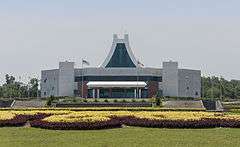Sabah State Legislative Assembly
The Sabah State Legislative Assembly (Malay: Dewan Undangan Negeri Sabah, Kadazandusun: Lamin Koundangan Pogun Sabah) is a part of the legislature of Sabah, Malaysia, the other being the governor of Sabah. The assembly meets at the Sabah State Legislative Assembly Building at Likas in the state capital of Kota Kinabalu.
Sabah State Legislative Assembly Dewan Undangan Negeri Sabah Lamin Koundangan Pogun Sabah 沙巴州议会 சபா மாநில சட்ட மன்றம் | |
|---|---|
| 15th Assembly (dissolved) | |
 Insignia of Sabah State Legislative Assembly | |
| Type | |
| Type | |
| History | |
| Founded | 25 September 1963 |
| Leadership | |
Yang di-Pertua Negeri | Juhar Mahiruddin since 1 January 2011 |
Speaker | |
Deputy Speaker | |
vacant since 30 July 2020 | |
Leader of the Opposition | vacant since 30 July 2020 |
Secretary | Bernard Joseph Dalinting |
| Structure | |
| Seats | 73 elected and up to 6 nominated |
Political groups | The Assembly is currently dissolved and all seats are vacant. |
| Committees |
|
| Elections | |
| First-past-the-post | |
Last election | 9 May 2018 |
Next election | 26th September 2020 |
| Meeting place | |
 | |
| Sabah State Legislative Assembly Building, Likas, Kota Kinabalu | |
| Website | |
| www | |
This unicameral legislature currently has 60 seats representing state constituencies elected through a first-past-the-post electoral system across the state.
Like at the federal level in Malaysia, Sabah uses a Westminster-style parliamentary government, in which members are elected to the legislative assembly through general elections, from which the chief minister and the cabinet are appointed based on majority support. The chief minister is head of government, while the governor acts as head of state. The largest party not forming the government is known as the official opposition, its leader being recognised as leader of the opposition by the speaker.
Members of the assembly refer to themselves as "Members of the Legislative Assembly" (MLAs) and sometimes as "state assemblymen".
The most recent assembly was elected on 9 May 2018 as part of the 15th Sabah State Legislative Assembly. A coalition of Sabah Heritage Party (WARISAN), Democratic Action Party (DAP) and People's Justice Party (PKR), with confidence and supply of United Pasokmomogun Kadazandusun Murut Organisation (UPKO), formed a government on 12 May 2018. This assembly was dissolved on 30 July 2020 by the governor of Sabah, Juhar Mahiruddin, following which a snap election will be held within 60 days. For this snap election, a total of 73 seats, including 13 additional seats that were endorsed in Parliament in 2019, will be contested.[2][3]
Lawmaking
In accordance with the traditions of the Westminster system, most laws originate with the cabinet (government bills), and are passed by the legislature after stages of debate and decision-making. Ordinary members may introduce privately (private members' bills), play an integral role in scrutinising bills in debate and committee and amending bills presented to the legislature by cabinet.
Nominated members
The governor may, at the advice of the chief minister, appoint not more than six nominated members of the assembly.[4] On 16 May 2018, Wilfred Madius Tangau (UPKO) and Stephen Wong (DAP) were made nominated members of the assembly, the same day they were admitted to the cabinet. On 11 June 2018, Lorreto Padua Jr. and Terrence Siambun, both of WARISAN, were made nominated members of the assembly.[5]
Officeholders
Chair occupants
Chair occupants of the assembly are appointed by the governor on the chief minister's advice. Syed Abas Syed Ali (BN-UMNO) has been the speaker since 7 August 2015[6] and has remained in the office after the state election that resulted in the change of governing party.[7] He is assisted by two Deputy Speakers, Ahmad Abdul Rahman (Independent) who was installed into the office on 7 June 2018[7][8] and George Anthony Ginibun (WARISAN) who was installed on 26 June 2018.[9][10]
Majority leader
The majority leader is always the chief minister, who also leads the cabinet. He is appointed by the governor on the basis that he is able to command a majority in the assembly. Mohd. Shafie Apdal (WARISAN), MLA for Senallang, has been the chief minister since 12 May 2018.
Minority leader
The minority leader is always the leader of the opposition appointed by the largest party not forming the government. On 4 July 2018, Dr. Jeffrey Kitingan (USA-STAR), MLA for Tambunan, has been reported selected as interim leader of the opposition until Musa Aman (BN-UMNO), MLA for Sungai Sibuga take the oath of office and the leadership in the opposition.[11]
See also
Notes
References
- Standing Orders of the Legislative Assembly of the State of Sabah (PDF). Retrieved 26 May 2016. Standing Orders 89, 90 and 91.
- "Snap election for Sabah as state assembly dissolved". Free Malaysia Today. 30 July 2020. Retrieved 30 July 2020.
- "Sabah state Legislative Assembly dissolved". New Straits Times. 30 July 2020. Retrieved 30 July 2020.
- Sabah (2018). The Constitution of the State of Sabah. Retrieved 23 May 2018. Art. 14(1)(c).
- "Warisan-led Sabah government ready to serve – Shafie". New Straits Times. 11 June 2018. Retrieved 28 June 2018.
- "Syed Abas Is Sabah State Legislative New Speaker". Bernama. 3 August 2015. Retrieved 7 June 2018.
- "Ahmad angkat sumpah Timbalan Speaker DUN Sabah" (in Malay). Utusan Borneo. 7 June 2018. Retrieved 7 June 2018.
- "Lawyer named Deputy Speaker". Daily Express. 8 June 2018. Retrieved 12 June 2018.
- Muguntan Vanar (26 June 2018). "George Ginibun appointed the second Sabah deputy Speaker". The Star. Retrieved 28 June 2018.
- "Ginibun is made Deputy Speaker". Daily Express. 27 June 2018. Retrieved 28 June 2018.
- Marzuki, Fifi Harteeny (4 July 2018). "Jeffrey Kitingan Ketua Pembangkang sementara ganti Musa Aman". Astro Awani (in Malay). Retrieved 4 July 2018.